“You’re killing us”: How pollution from Indian-owned company threatens residents, environment in Ogun community
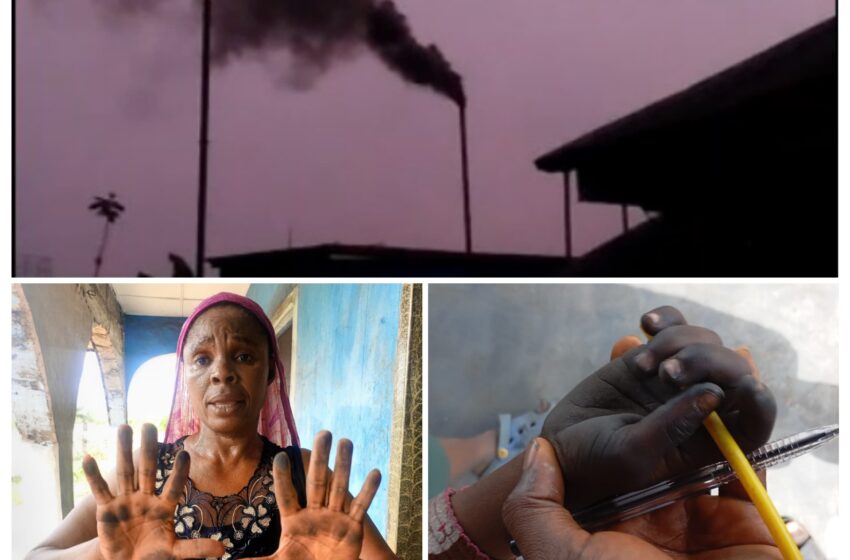
In Lusada Local Council Development Area (LCDA), Ado Odo/ Ota Local Government of Ogun State, residents are threatened by constant pollution from Salasar Enterprises Limited, an Indian-owned factory operating in the area. In this report, BLESSING CHUKWUNEKE, FRANCIS BLESSING and JAMES OJO ADAKOLE captured the plights of the residents of the community.
It was 3 February 2025. Chukwu Bose looked forlorn, her gaze typical of someone desperate for a lasting solution to a prolonged dilemma. With a bucket of soapy water and a mop in hand, the resident of Sunday Aina Close, along Lusada-Igbesa road in Ado-Odo/Ota Local Government Area of Ogun State, was cleaning up the soot – tiny carbon particles that result from the incomplete combustion of fossil fuels, wood, or other organic matter – in her house when Crisp Nigeria visited her apartment.
Enraged, she huffed and puffed as she attempted to rid her home of the dark particles covering nearly every part of the building – including her two children’s rooms. From her standing fan, sockets, chairs and tables, ceiling, bed, and window nets to her “precious” make-shift prayer altar comprising a crucifix, rosary, candles, framed image of “Mother Mary” and other items, nothing was spared by the pollution.
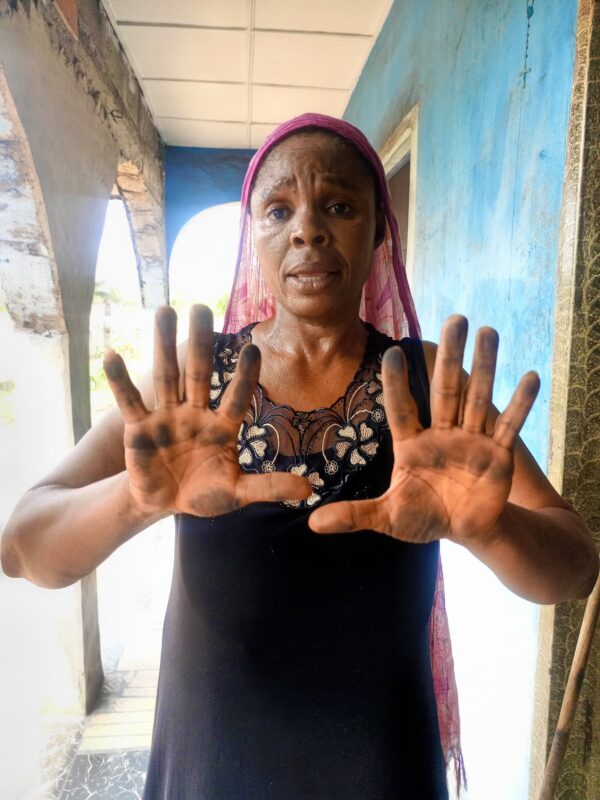
Since she moved into the area three years ago, dealing with constant pollution from Salasar Enterprises Limited, an Indian-owned factory operating in the area, has been a nightmare for her family.
“The pollution outside is not the problem. The one inside is worse. The windows are locked, yet it (pollution) still creeps in. I clean the house daily to reduce its effect on me and my children. I’m always going to the hospital to buy drugs. I have difficulty breathing, and my blood pressure keeps rising. I also cough often,” she lamented, her face illuminating her helplessness.
Daily, she said she grapples with fear of the unknown for herself and her two children. She has genuine reasons to be worried. Globally, ambient (outdoor) and household air pollution is associated with 7 million premature deaths annually, according to the World Health Organisation (WHO).

Mrs Bose is not alone.
Before Alexander Allison, her neighbour, even spoke with Crisp Nigeria, his soot-covered legs told his story. Every corner of the retired police officer’s house was filled with black dust, and the condition of his environment was almost enough narration. His gate, living room, bedrooms, kitchen, dining room floors, and even the plants bore witness to the terrible ordeal he and his children had endured for some years.
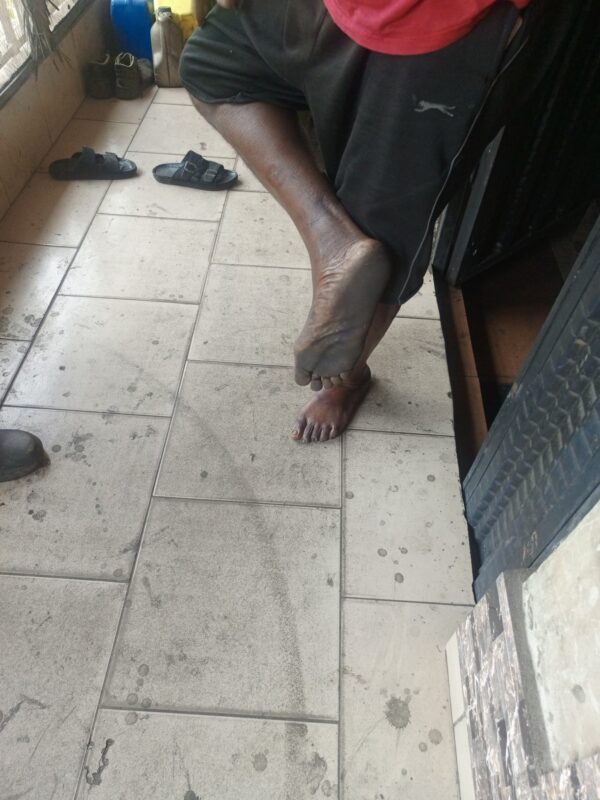
‘Sometimes, we can’t breathe properly’
On Wednesday, 18 December 2024, a thick, acrid smell hung over LASU Staff Estate, Sunday Aina Close, burning the lungs of these reporters as they walked through streets. From darkened rooftops, and children playing with soot-covered hands; the effect of pollution on the area was visible. The source of the pollution? Salasar Enterprises Limited.
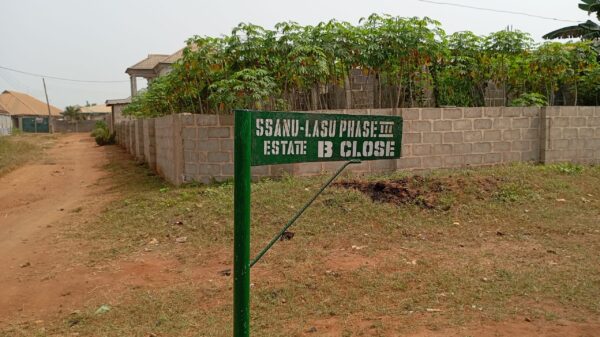
Salasar Enterprises Limited specialises in recycling used tyres and used engine oil. Checks on the Corporate Commission of Nigeria (CAC) showed the company was founded on 11 December 2007. Further findings on NG-Check, a platform which provides information about Nigerian companies, listed the company’s directors as Ulu Benjamin C, Vineet Kumar Malpani, Suneet Kumar Malpani, Vijay Kumar Malpani, Hanuman Shai Jangid, and Gaurav Kumar Mohta.
For years, residents of the area claimed the company spewed black carbon into the environment, coating homes, streets, and farmland with toxic soot due to a process called pyrolysis involving the conversion of tyres to engine oil. Residents of Sunday Aina Street, LASU Staff Estate, and other nearby neighbourhoods in Lusada said they live under the constant chokehold of industrial emissions from the company, whose pyrolysis operations—burning ‘scrap’ tyres and processing carbon black —release thick, black smoke into the air, day and night.
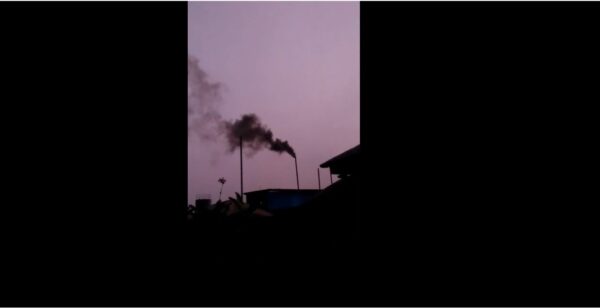
For Wusu, an engineer and a retired worker at the Federal Ministry of Health, the pollution is unbearable. “The factory (referring to Salasar Enterprises Limited) burns tyres. Sometimes, the air is so bad we can’t breathe properly. During the rainy season, it gets worse, especially at night or early in the morning,” he said, pointing to the soot-covered walls of his home and browned roofs.
Eronmonsele Okpekpe is another resident badly affected by activities of Salasar Enterprises Limited. Mr Okpekpe said his family has majorly been forced to stay indoors most of the time due to the soot from the company. He lamented that despite this, dark particles still mostly covered his floors and curtains.
“When you dry a white cloth, it will most likely be stained. “Somebody cannot even enjoy his own property— person dey use money buy wetin go kill am?” he asked rhetorically in Pidgin.
Dr Adeola Aribike’s joy knew no bounds when she recently moved to the area due to its serenity. Having recently retired from the civil service, she had hoped the area would be the dream post-retirement haven.
But a few months after moving into the area, she is faced with a new challenge: pollution. “There’s offensive odour,” she lamented while speaking on the company’s operation. Dr Aribike said although the company “are the ones grading this road and also dug the gutter, this black thing (soot) is from their company.’’
Children are not excluded
Air pollution is one of the greatest environmental risks to child health, according to the WHO; and this has been Mrs Bose’s major worry. “We’re suffering, Just look at my children’s room,” she ranted as she took Crisp Nigeria on a tour of her apartment, showing the dark particles on her kids’ bed and other items. Like her kids, many other children in the area are constantly exposed to carbon emissions from the company.
During one of the many visits to the area by these reporters, they met children playing in front of a house just adjacent to the company. With their hands and feet blackened, they played and giggled while touching surfaces, many oblivious of the danger posed by the soot they inhaled and touched.
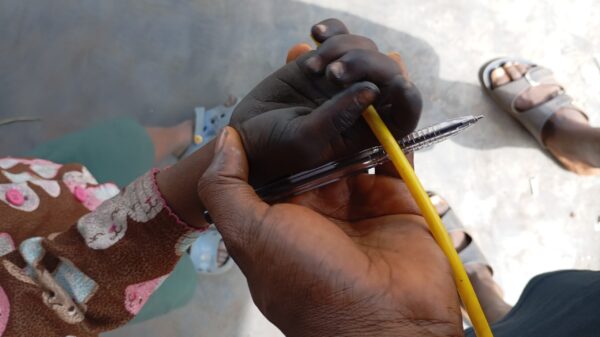
Salamat and Salam, both 10 years old, understood the danger they faced. Speaking in Yoruba, they described the suffocating effect of the emissions. “The area smells. Sometimes, we need nose masks because it affects air quality. During those times, the area closer to the company becomes really dark,” they said.
Mr Ifeoluwa, another resident, is also disturbed by emissions from the company, which have become an unavoidable part of his life since he moved into the area seven years ago. While he admitted that he had not had any health issues as a result of the emissions from the company, he feared for children in his compound.
“The smell actually woke me up this afternoon. They (Salasar Enterprises Limited) work 24 hours. There are three kids in my compound. Generally, the area is okay, but the release of the smoke is very bad.”
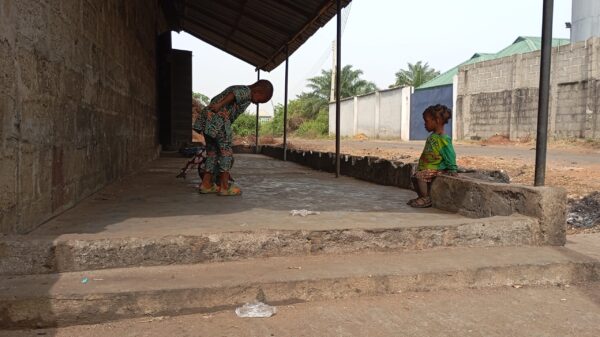
How safe is the air quality in the area?
For 11 days, Crisp Nigeria monitored the air quality around Sunday Aina Street, LASU Staff Estate, and other nearby neighbourhoods, using a Temtop M2000 outdoor air monitor device. Crisp Nigeria checked the volume of Carbon dioxide (CO2), Formaldehyde (HCHO), fine particulate matter (PM2.5) and particulate matter (PM10) in the selected areas.
The reporters compared the concentration levels of each of these components obtainable in the area against generally accepted benchmarks. For CO2 concentration, anything less than or equal to 700ppm is good, 701ppm – 1,000ppm is moderate while 1,501ppm – 2,500ppm is considered unhealthy. For PM2.5, anything less than or equal to 12µg/m³ is considered good, 12.1 to 35.4µg/m³ is deemed moderate while 55.5 to 150.4 µg/m³ is considered unhealthy for residents. For HCHO, anything less than or equal to 0.1mg/m3 is considered healthy while anything above 0.1mg/m3 is deemed unhealthy. Similarly, PM10 from 54.0µg/m³ downward is considered good, that of 55 to 154µg/m³ is regarded as moderate while from 155 to 254µg/m³ is said to be unhealthy.
Findings showed that the PM2.5 concentration level was mostly moderate, as it ranged between 20 and 35µg/m³. However, the figure went up on some days, indicating that it was unsafe for residents. On 10 January 2025, for instance, the PM2.5 concentration level hit as high as 78µg/m³, clearly showing it was unhealthy for the residents.
PM pollution, primarily from vehicle emissions, industrial activities, and burning of waste, has been linked to serious health risks, including cancer, according to a 2015 study by the International Agency for Research on Cancer (IARC). Long-term (months to years) exposure to PM2.5 has been linked to premature death, particularly in people who have chronic heart or lung diseases, and reduced lung function growth in children. According to the British Heart Foundation, living for one year in an area with high levels of fine particulate matter (PM2.5) is as damaging to human health as smoking 150 cigarettes annually. WHO also noted that outdoor air pollution in cities and rural areas “is causing fine particulate matter which results in strokes, heart diseases, lung cancer, acute and chronic respiratory diseases.’’
This means if left unchecked, Mrs Bose – who is already grappling with breathing difficulty – and her two children, as well as others living around the company, are at risk.
Meanwhile, results of HCHO, CO2, and PM10 showed they were mostly within the normal concentration levels in the areas studied. The results, though significantly encouraging, might not be unconnected to the fact that this investigation was done when the company was just taking off for the year 2025. Between 18 December 2024 and early parts of January, sources told Crisp Nigeria that activities slowed down at the company due to the festive season, which saw some staff travelling home. Another challenge faced was getting the specific period the company releases its carbon emissions after production, making it difficult to measure the direct impact on the air quality of the area.
Precious Ede, a professor of climatology and air pollution at Rivers State University (RSU), told Crisp Nigeria that burning petroleum products and rubber such as tyres produces black carbon, a major contributor to climate change. “Burning of tyres generates soot and soot in itself is black carbon and black carbon is very dangerous to health,” he explained.

The climate expert said scientific research has established that prolonged exposure to black carbon could lead to respiratory illnesses such as asthma, bronchitis, and chronic obstructive pulmonary disease (COPD). Others, he said, include lung cancer due to long-term inhalation of soot particles, skin and eye irritation caused by continuous contact with polluted air as well as contamination of water sources, which affect agriculture and livestock.
Corroborating him, Philip Jakpor, the executive director of Renevlyn Development Initiative (RDI), described the burning of tyres in residential areas as a significant environmental and health hazard. Mr Jakpor explained that tyres contain toxic pollutants, including carbon dioxide, nitrogen oxides, and hazardous particulate matter. When burned, he said, these pollutants are released into the air, posing severe health risks such as respiratory illnesses and cancer.
“When companies do this (burn tyres), they subject those who live in such an environment to a lot of respiratory illnesses and conditions that can even lead to cancer. It is bad enough that we are complaining about generator emissions and when you add tyres to that, that means you just want to kill people.”
Thriving business – But at what cost?
On 18 December 2024, a journalist with Crisp Nigeria went undercover into the company. Disguising as someone interested in supplying used tyres to the company for recycling, he met an official heading the tyre unit who took him through the business process.
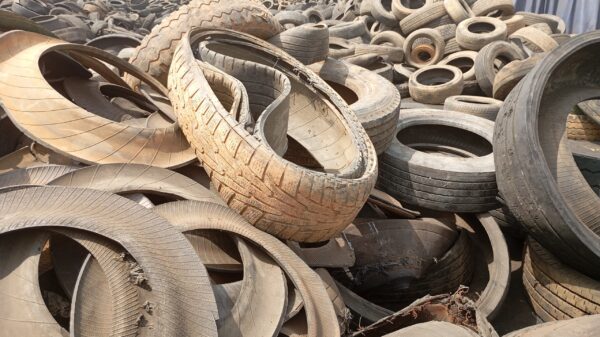
The official, who prohibited this journalist from filming within the premises, citing company policy, explained that the company usually buys uncut big-size tyres for N6,000 and those already cut go for N6,300. He further explained that small tyres were usually bought for N4,000.
When the reporter visited the facility, its premises boomed with activities as many workers were seen going about their day-to-day tasks. Insider sources told this reporter that smoke does not really come out during the tyre-burning process. The sources said the real smoke happens when they are cooling the fire “and we open the Carbon gate”
“They open Carbon gate anytime they are done with the production,” a source said. While the company’s operation continues, residents continue to lament.
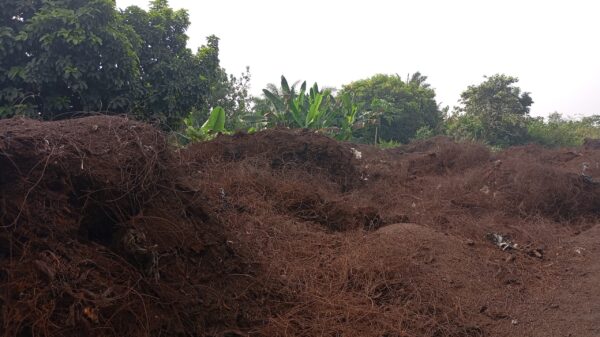
‘Carbon emissions’ impact not immediate for healthy people’
During this investigation, Crisp Nigeria visited hospitals around Lusada to ascertain the level of respiratory-related cases handled by the health facilities in recent months and if there was any link to pollution. Medical officials at the hospitals said while there had been a few cases of respiratory distress, they were not directly connected to pollution.
At St. Ann’s Hospital in Lusada, the official in charge, who identified himself as Dr Emmanuel, explained that the impact of carbon emissions on healthy individuals are usually long term, not immediate. He also disclosed that the facility had handled several asthma-related cases in recent times.
“Carbon emissions lead to interstitial lung disease (ILD) and pneumoconiosis. However, the effects take 10 to 15 years to manifest in healthy individuals. But for people with asthma, chronic obstructive pulmonary disease (COPD) or tuberculosis, the risk is immediate and we have seen many asthma patients from the area (around the company), but it didn’t look like the cause was from the fumes, but other things that exacerbate asthma.”
When the reporters visited God’s Will Hospital, Lusada, Dr Isaiah, the official in charge, said “in the past 6 to 8 months, we haven’t had any significant cases of respiratory problems that we could directly attribute to carbon emissions.”
The medical doctor added that “even if the impact of carbon emissions manifests, it cannot automatically be identified as the cause.
Many complaints, no solution
Residents interviewed lamented the lack of concrete response from the company and relevant authorities, despite several complaints. “I have been living here for three years and I haven’t seen any change. Do you know how many times I have fought them over this pollution issue?” Mrs Bose asked, visibly displaying her frustration. The mother of two said she had previously engaged Musa Modupe, the executive director, and other key Indian officials from the company before, but nothing was done despite promises made.
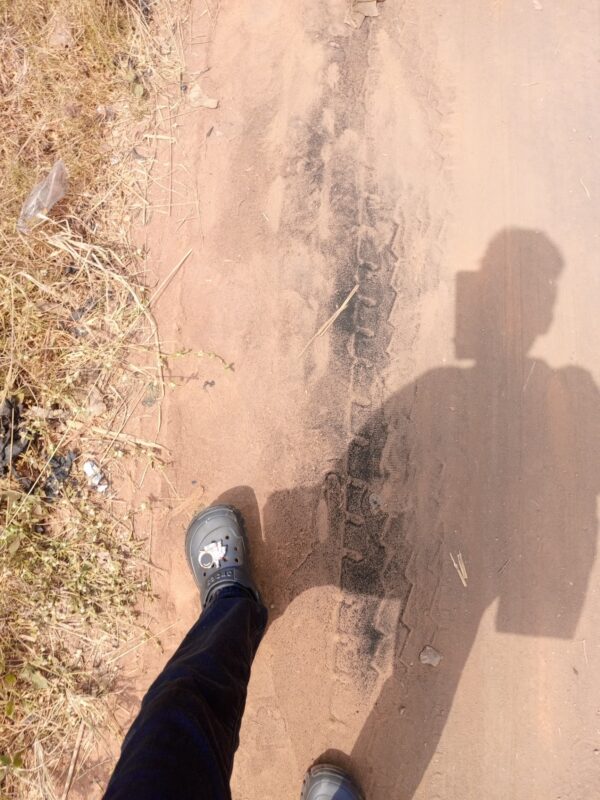
She also claimed Mr Modupe once walked her out of the company during her many visits to complain and alleged that the official bragged about having the backing of the police and other authorities to operate. Crisp Nigeria could not independently verify her claim.
“I told him (referring to Mr Modupe) ‘you are killing us and making money on our behalf’. He then got the security to walk me out,” she recounted.
Also speaking, Mr Okpekpe said the fumes slightly abated at a point after complaints from residents. He said at the time, the company installed a higher smoke passageway (chimney exhaust) but noted that the effort was not enough. He added that since the company expanded its operations, “the thing (pollution) became worse again.’’
Another resident, identified as A.E Egbe, said many people in the area have resigned to fate and are forced to adapt. “Personally, I haven’t faced health issues, but I know asthmatic patients would struggle here. Also, when it rains, water collected outside turns murky with particles, but we adapt,” he said.
For those unable to bear the situation, vacating the area becomes the only alternative. A resident simply identified as Mr Joseph told these reporters people have been deserting their properties due to the environmental pollution. Mr Allison and Mrs Chukwu also explained that one of their neighbours, an elderly woman, once sold her house after she became sick and could no longer bear the condition of the environment. They added that others have also abandoned their buildings (uncompleted) and are trying to sell them off, usually to unsuspecting buyers.
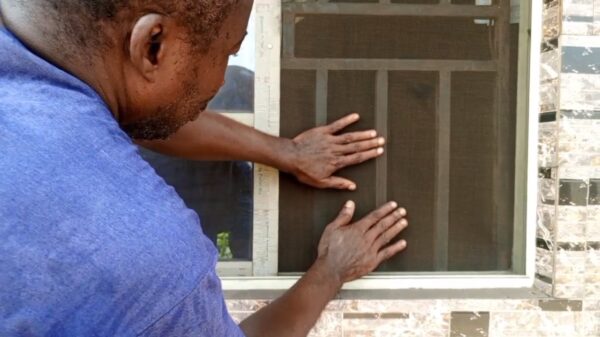
Is Nigeria serious about addressing climate change?
Despite the dangers, carbon emissions are rife in several parts of Lusada and across the country, posing significant risks to the people and the environment. The development contrasts sharply with Nigeria’s fight against climate change. Nigeria is a signatory to the African Charter on Human and Peoples’ Rights which states that “all peoples shall have the right to a general satisfactory environment favourable to their development”.
The country also ratified the Paris Climate Agreement – aimed at reducing climate pollution and advancing a greener future – in 2017. As a signatory to the agreement, Nigeria committed to cutting its carbon emissions unconditionally by 20 per cent or conditionally by 45 per cent with international support by 2030.
In 2014, Nigeria also enacted the National Environmental (Air Quality Control) Regulations to ensure Nigerians have “access to clean air” and also checkmate carbon emissions by companies.
While the country has demonstrated a level of commitment via the Compressed Natural Gas (CNG) and other initiatives, stakeholders said unchecked carbon emissions in the country remain worrisome. This, concerned stakeholders noted, question Nigeria’s commitment to fighting climate change as activities causing environmental degradation abound in the country.
“Nigeria is not matching words with action,” Mr Ede said, when asked to assess the country’s extant climate change policies in addressing carbon emissions from companies. He argued that the country cannot effectively tackle carbon emissions and climate change since its economy is built around crude oil.
“Nigeria derives 80% of its revenue from crude oil exports. If we shut down hydrocarbon industries, the economy could collapse. But at what cost? The lives of ordinary Nigerians? I can’t advise that the burning of hydrocarbons be stopped because by doing so the Nigerian economy will collapse. I do not support the degradation of the environment, but survival is implied here.”
On his part, Mr Jakpor criticised the effectiveness of Nigeria’s environmental and climate policies, stating that while the government has introduced regulations, enforcement remains weak.
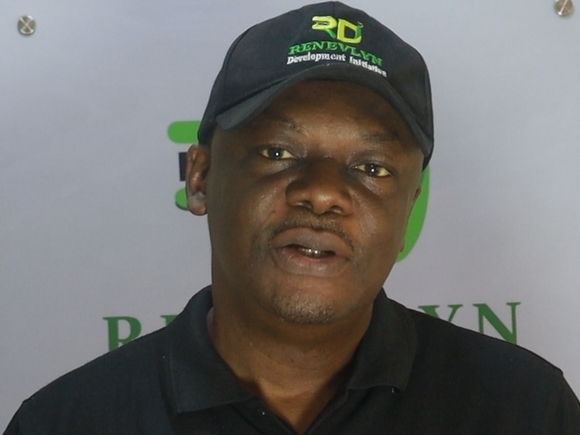
“In terms of climate change, tyre burning is just one aspect. Gas flaring and bush burning are major contributors, yet Nigeria remains one of the highest gas-flaring countries in the world,” he said, referencing a 2024 flare report,” he quipped.
While acknowledging the government’s introduction of Compressed Natural Gas (CNG) as a step in the right direction, Mr Jakpor insisted it is not enough.
“It is the government’s duty to regulate where companies operate. If strict environmental regulations were enforced, companies that burn tyres would be held accountable under the ‘polluter pays principle,” he stated.
On Nigeria’s pledge to cut carbon emissions by 20% by 2030, Mr Jakpor expressed concerns over ongoing oil exploration in the Niger Delta and the North. “The more we invest in oil production, the more pollution we create. This leads to hazardous air quality, erratic weather patterns, and worsening climate change,” he warned. He called for a shift towards safe and affordable renewable energy, stressing the need for clear strategies to reduce emissions at the source.
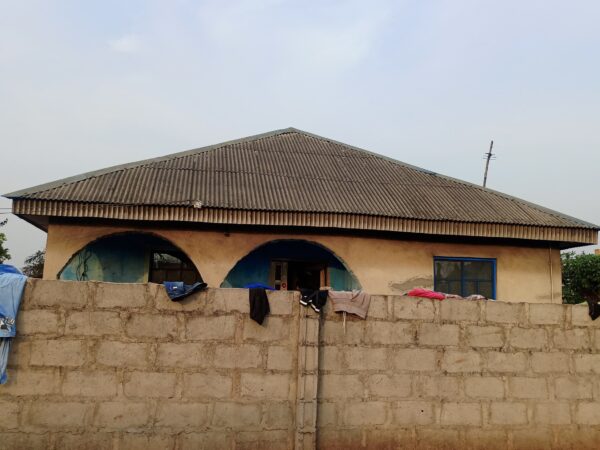
Ogun govt yet to receive formal complaints from Lusada residents – Official
When contacted, the Ogun State Commissioner for Environment, Ola Oresanya, said the state strongly frowns at indiscriminate pollution, but noted that his ministry was yet to receive any formal complaints from residents of the area in recent times concerning Salasar Enterprises Limited.
“There are regulations on air emission. Generally, not just carbon in particular, but all various emissions that come from both industrial and domestic activities. So there’s a law,” he said.
Mr Oresanya also explained that while air pollution regulations exist, enforcement requires certain processes, which must be initiated by the host community.
“The community is a first responder when it comes to care polluting or any form of pollution. The community is a first responder because they are the ones that will feel it most. So, what do they need to do? The same channel whereby they complained earlier, and there was a response, They need to get back through that channel and state it clearly: look what we reported the other time, the company remained recalcitrant, they are not doing what they are supposed to do.
“So, when the community complains like that, or after we detect the pollution, what do we do? We send letters to the industry or the polluter … Maybe it’s a one-off thing, maybe it’s out of carelessness. Maybe it’s a production deficiency. We warn them. We try to correct them, and we give them time to correct themselves, either through righting their wrong procedures or installing new equipment. So, we usually give them time to correct themselves.
“After this period has expired, we go back to confirm if they’ve done it, if they’ve not done it, we now give them a shorter ultimatum. Usually, the time ranges from seven days to two weeks to install. And after we go back, and we see that they have not done it, the next thing is, we go to court. We get a court order to seal up such companies; either we give them a stop work order or we seal them up. That’s the procedure.”
‘We’re doing our best’ – Salasar Enterprises Limited speaks
When contacted, Musa Modupe, the managing director, claimed the company has been doing its best to ensure its carbon emissions do not harm the residents.
“There is no way anywhere in the world where you do this type of job that you will not see one thing or the other. We cannot reach 100%,” he said.
“But, so far so good. We have tried our best in the past seven, eight years, except for people who did not want to appreciate us. People come from ministries. They visit us many times a year. So I will not say we are 100% correct. But for me, that is why for me, that is why I expected people to come and see us, what we are doing, how we are doing it.
“So, the situation is that we are doing our best. My brother, we cannot reduce emissions totally, you cannot reduce the thing 100%, I have to be frank with you. But so far so good, technically, we have done our best. We are not the only ones doing this business in Ogun and Lagos states. But I know if you put us on the scale, I know you will put us on number one.
“We were the first to start. We are the first to start this business in Nigeria. Yes, we are the first to start this business, if you put us on a scale to see how we are performing, environmental-wise, you will give us a good mark. I know for sure.”
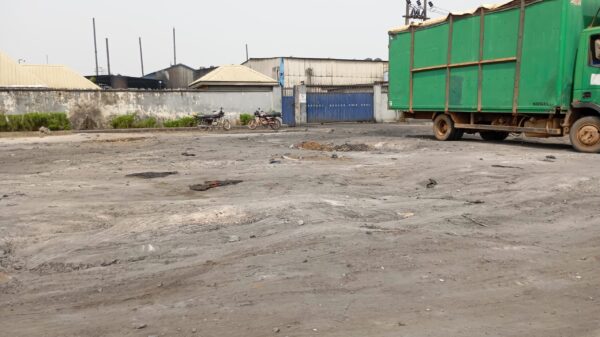
He also claimed some of the complaints against the company were fueled by those displeased by its operation. “People can tell you anything. Not everybody likes us. I want to be frank with you,” he added.
“We’ll investigate it” — NESREA
On its part, the National Environmental Standards and Regulations Enforcement Agency (NESREA) promised to look into Crisp Nigeria’s findings.
In a letter dated February 24, 2025, and signed by Elijah N. Udofia, its director of enviromental quality control, the agency said it had already instructed its office in Ogun state to visit the area.
“Meanwhile, our field office in Ogun State has been directed to investigate the matter and revert urgently. While the agency awaits further collaboration with you, please accept the assurances of the Director General/CEO’s warm regards,” the statement partly reads.
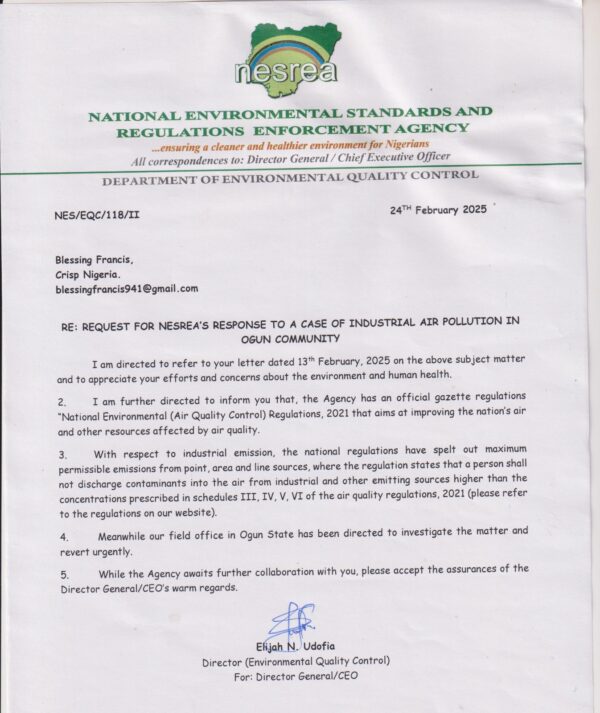
While industrialisation creates jobs, the human cost is devastating. Unless stronger environmental laws are enforced and urgent actions are taken, Mrs Bose risks respiratory-related issues with constant exposure to carbon emissions, while her children remain endangered.
This reporting was completed with the support of the Centre for Journalism Innovation and Development as part of the Centre for Investigative Journalism’s Open Climate Reporting Initiative.

